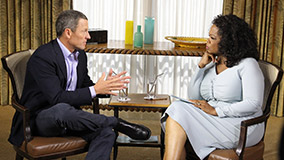It has been a fascinating exercise watching two international celebrities, Lance Armstrong and Oprah Winfrey, engage in full-on brand management this past week.
Much has been written about Armstrong’s motivation for finally admitting to wide-spread doping, lying, and cheating during his tenure as the king of Tour de France racing. The questions abound: Can he really refurbish his reputation? Will the good will connected to his cancer charity work ever be strong enough to help his image rebound from the devastating facts finally made public?
Media pursuit
There will be many PhD theses written about Armstrong’s calculated approach. What about Winfrey’s motivations? No doubt her team avidly pursued him for months, if not years, to try and secure an agreement for him to appear on her show. Undoubtedly so did the teams for other broadcast media heavy hitters like 60 Minutes, Barbara Walters, 20/20, Diane Sawyer, etc.
I argue that Armstrong gravitated to Winfrey because she’s not known for being an aggressive interviewer. She’s less confrontational, and often talks too much when asking questions, allowing the interviewee to avoid directly answering what was a solid query that demanded further probing. By choosing to tell his story to Winfrey, he had more control of the tone and flow of the interview.
How did Winfrey benefit?
First, the use of traditional and social media to acquire free promotion for the exclusive interview was rampant. Word about the interview was put out one week prior. Then the interview’s primary news – Armstrong admitting guilt – was leaked. This prompted a week long media frenzy to heighten awareness about the broadcast. By the time the first interview actually aired, media were saturated with the story and consumer interest was high.
Secondly, while Armstrong wanted to benefit from the brand attribute of sincerity (Aaker, 1997, p. 347) that Winfrey exudes, she too capitalized on this. The interview was billed as an attempt to get to the heart of the matter – not too tough but trustworthy.
Finally, this event appears to be part of strategy to reboot the “Oprah” brand. Since launching her own network more than two years ago, she has lost a considerable amount of money and prestige. She’s fired staff and reconceived the network’s mission a few times.
The show that featured Armstrong, Oprah’s Next Chapter, normally runs on Sunday nights and is the network’s best offering. It plays to Winfrey’s strength, celebrity profiles, that worked so well on her incredibly successful syndicated show, Oprah. By running the interview over two nights on unconventional nights – Thursday and Friday – she drew in viewers who may have stuck around to check out other network programming. New viewers would be good. That approach would have helped entice advertisers to come on board as well – a solid revenue stream continues to be important for sustained success.
In the end, this was a masterful dance between two brand management masters.

